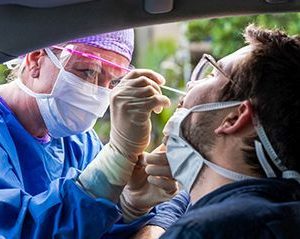- Recognizing the Signs of Hypothyroidism
- 10 Strategies to Overcome Insomnia
- Could Artificial Sweeteners Be Aging the Brain Faster?
- Techniques for Soothing Your Nervous System
- Does the Water in Your House Smell Funny? Here’s Why
- Can a Daily Dose of Apple Cider Vinegar Actually Aid Weight Loss?
- 6 Health Beverages That Can Actually Spike Your Blood Sugar
- Treatment Options for Social Anxiety Disorder
- Understanding the Connection Between Anxiety and Depression
- How Daily Prunes Can Influence Cholesterol and Inflammation
Had Sinus Surgery? Better Skip Nasal Swab COVID Test

If you’ve had major sinus or skull base surgery, you should talk with your ear, nose and throat doctor before getting a COVID-19 nasal swab test, researchers advise.
It’s also crucial for health workers performing swab testing to ask whether the patient has had extensive sinus or skull base surgery, said Dr. Philip Chen, an associate professor of otolaryngology-head and neck surgery at the University of Texas Health Science Center at San Antonio. Such a patient is more vulnerable to injury if swab testing is done incorrectly.
“If so, other modes of testing such as at the back of the throat should be performed,” Chen said in a school news release.
He is the senior author of study that found online information about COVID nasal swab testing doesn’t include warnings for people who’ve had extensive sinus or skull base surgery.
“Not one site of the 200 we searched online had information cautioning against blind nasopharyngeal swab testing in those with a history of sinus or skull base surgery,” Chen said.
Nasal swabs are used to collect samples for polymerase chain reaction tests widely used to detect infection with the coronavirus that causes COVID-19.
It’s not clear how often nasal swabbing is done incorrectly, but one study that reviewed online videos “found that about half of the videos on how to perform COVID-19 nasopharyngeal swabs were incorrect,” including incorrect angling of the swab and inappropriate depth of insertion, Chen said.
If the swab angle is too high, a puncture may occur. While rare, injuries from incorrect nasal swab technique can include cerebrospinal fluid leakage or severe bleeding.
The study was published March 4 in the journal JAMA Otolaryngology-Head & Neck Surgery.
More information
The U.S. Centers for Disease Control and Prevention has more on COVID-19 testing.
SOURCE: University of Texas Health Science Center at San Antonio, news release, March 4, 2021
Source: HealthDay
Copyright © 2026 HealthDay. All rights reserved.










